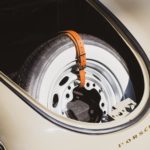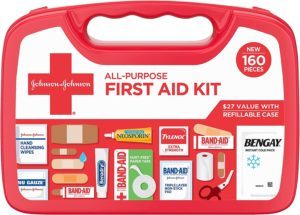Whether you’re heading out for your morning commute or starting a cross-country road trip, you probably have a lot on your mind when you get behind the wheel. One thing you probably aren’t thinking about is ending up in an emergency situation that leaves you stranded. But unfortunately, it can happen.
We’ll help you get prepared for when your normal drive goes awry—from a flat tire, engine trouble, or a discarded piece of road debris you didn’t see—with this list of essential things to keep in your vehicle for safety.
Equipment to get your car back on the road
- Spare tire: When you bought your car, it likely came equipped with a spare tire. If you’re not sure, check your trunk, as that’s the usual storage spot for a spare. If you don’t see a spare tire or if you’ve already used it, replace it at your local auto body shop to keep yourself prepared while on the road.
- Tire repair kit: Your spare tire isn’t going to do much good if you don’t know how to replace it. Your car should also have a tire jack and tire iron to allow you to change the tire if the time comes. A portable tire pump you can plug into your lighter or USB port is another necessity to keep in a tire repair kit in case you need to pull off the road to fill up a low tire. Kits range from $15 to $50 but you can snag this highly-rated kit on Amazon for $19.99
- Jumper cables: If your car battery dies while you’re out and about, you’re going to need jumper cables. It can be easy to keep them with your spare tire, so you know they’re always with you. If you need them, you can get them here for $26.09.
Supplies you need for your glove compartment
- Map: We know it may be a little old school, but a real, paper map can go a long way. If you’re caught on back roads with no cell phone service, you’re going to need it.
- Flashlight, extra batteries, road flares and reflectors: These will come in handy if you need to get out of the car and check on something while you’re driving at night. And if your car breaks down in the dark, have some reflective triangles or a road flare stashed somewhere in your car to ensure other drivers will see you as you take a look.
- Matchbook, hand warmers and small candle: What if your car breaks down in cooler weather? These items can help keep you warm while you wait for assistance.
- Food: Try to keep a few bottles of water, granola bars or other non-perishable snacks with you. Not only is this nice when you’re running errands and need a snack, but if you ever get stuck in the snow, on the freeway, or run out of gas, you may need it.
- Money: It’s always good to keep some emergency cash in your glove compartment just in case. You’ll be at ease knowing it’s there.
Other emergency supplies
- First aid kit: A first aid kit should always travel with you. This emergency kit should contain bandages, pain relievers such as ibuprofen, hand sanitizer, and antihistamines. The addition of water bottles is also a good idea.
- Portable cell phone charger: The cold weather can cause phone batteries to die faster. Keep a portable phone charger with you when you’re on the road so your phone is ready to use for emergencies or directions.
- Seasonal items: Some items are only necessary a few times a year. For example, in the winter, keep a blanket and an ice scraper with you. In the spring, avoid being caught in an unexpected downpour, and keep an umbrella in your backseat or trunk.
- The phone number for roadside assistance: If you have roadside assistance, keep the phone number handy in your cell phone and on a card or piece of paper in the glovebox in case you need a tow truck or someone to jumpstart your vehicle.
All of these supplies will help in the case of an emergency. However, reliable car insurance with Roadside Assistance will stick with you through it all. If you’re trying to find ways to be prepared with effective auto insurance coverage, call us at 262-641-0644 or visit our Website at www.rfeest.com to learn more.

